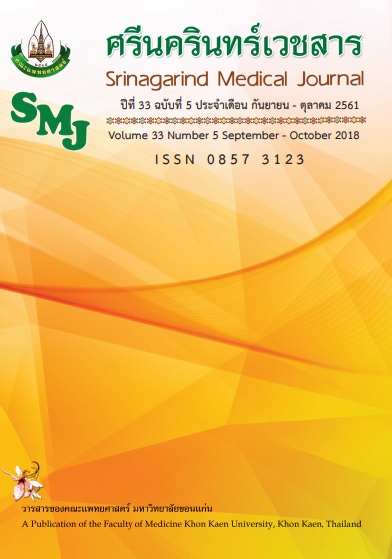Factors that Correlated to Success in Complicated Chronic Diseases Care in Elder at Chiwanan Center, Sawanpracharak Hospital
Keywords:
ผู้สูงวัย, โรคไม่ติดต่อเรื้อรัง, ความสำเร็จในการควบคุมโรค, Elder, non communicable diseases (NCD), Successful factorsAbstract
ปัจจัยที่สัมพันธ์กับความสำเร็จในการดูแลผู้ป่วยสูงวัยที่เข้ารับการรักษาโรคเรื้อรังซับซ้อน
ที่ศูนย์ชีวนันท์โรงพยาบาลสวรรค์ประชารักษ์
อัญชลี อังศธรรมรัตน์1*, สมใจ รัตนศรีทอง2
1กลุ่มงานเภสัชกรรม โรงพยาบาลสวรรค์ประชารักษ์
2ศูนย์ชีวนันท์ โรงพยาบาลสวรรค์ประชารักษ์
หลักการและวัตถุประสงค์: จากรายงานการรักษาผู้ป่วยสูงวัยที่เป็นโรคเรื้อรังซับซ้อนรักษายากจำนวน 610 ราย ระหว่าง 15 พฤศจิกายน 2555 – 31 กรกฎาคม 2558 สามารถควบคุมโรคได้ตามเกณฑ์ 237 ราย คิดเป็นร้อยละ 38.85 ดังนั้นการศึกษานี้จึงมีวัตถุประสงค์เพื่อศึกษาปัจจัยที่สัมพันธ์กับความสำเร็จในการควบคุมโรคในผู้ป่วยสูงวัย ที่เป็นโรคเรื้อรังซับซ้อนรักษายาก
วิธีการศึกษา :ศึกษาเชิงพรรณนา (Descriptive Study) ในผู้ป่วยที่รับการรักษา ระหว่าง 1 สิงหาคม 2558 – 31 กรกฎาคม 2560 โดยศึกษาจากเวชระเบียน สัมภาษณ์ เยี่ยมบ้าน หรือสัมภาษณ์ทางโทรศัพท์ โดยสุ่มตัวอย่างจากผู้เข้ารับบริการ 408 ราย
ผลการศึกษา :ผู้สูงวัยที่สุ่มศึกษา 199 ราย เป็นผู้ป่วยเบาหวาน จำนวน 75 ราย ความดันโลหิตสูง 63 ราย ภาวะไขมันในเลือดสูง 56 ราย และภาวะโรคอื่น ๆ 5 ราย ปัจจัยสำคัญในผู้ป่วยที่ควบคุมได้สำเร็จคือ การมีผู้ดูแลใกล้ชิด มีอัตราส่วนแต้มต่อ 5.0 (OR 5.0, 95% CI 3.2 – 7.8) ความรู้และทัศนคติของผู้ป่วยในการศึกษาข้อมูลโรคและยามีอัตราส่วนแต้มต่อ 4.7 (OR 4.7, 95% CI 2.7 – 8.0) และการเก็บรักษายาถูกต้องมีอัตราส่วนแต้มต่อ 2.5 (OR 2.5, 95%CI 1.6 - 4.0)
สรุป :ปัจจัยสำคัญที่สัมพันธ์กับการควบคุมโรคได้สำเร็จ คือการมีผู้ดูแลใกล้ชิด การศึกษาภาวะของโรครวมถึงยาที่ผู้ป่วยใช้ และการเก็บรักษายาที่ถูกต้อง
คำสำคัญ :ผู้สูงวัย; โรคไม่ติดต่อเรื้อรัง; ความสำเร็จในการควบคุมโรค
Background and objective: Initial data from 15th November 2012 to 31st July 2015 indicated that there were 610 patients diagnosed with complicated non communicable diseases (NCDs), with 237 patients – accounting for 38.85 percent – whose NCD can be controlled to specific criteria. This study aimed to evaluate the factors leading to successful control of NCDs.
Methods: This was a descriptive study in patients treated during 1st August 2015 to 31st July 2017. Randomized studying 408 patient records and interviewing – both over the phone and in person during home visiting.
Results: Random 199 patients there were diabetes mellitus 75 patients, hypertension 63 patients, dyslipidemia 56 patients and miscellaneous 5 patients. The three largest factors leading to successful control of NCDs were close care of the patient (OR 5.0, 95%CI 3.2 – 7.8), patient knowledge and outlook in studying the disease and medicine (OR 4.7, 95%CI 2.7 – 8.0), and proper storage of medicine (OR 2.5, 95%CI 1.6 - 4.0).
Conclusion : Three factors leading to successful control of NCDs are close care of the patient, patient’s knowledge and study in diseases and medication, and proper storage of medicine.
Key words : Elder; non communicable diseases (NCD); Successful factors
References
ชื่นจิตร กองแก้ว. การใช้ยาในผู้สูงอายุไทยเขตภาคเหนือตอนล่างประเทศไทย. นนทบุรี : สถาบันวิจัยระบบสาธารณสุข; 2557.
Kongkaew C, Noyce PR, Ashcroft DM. Hospital admissions associated with adverse drug reactions: a systematic review of prospective observational studies. Ann Pharmacother 2008; 42: 1017–25.
Claydon-Platt K, Manias E, Dunning T. Development and evaluation of a screening tool to identify people with diabetes at increased risk of medication problems relating to hypoglycaemia and medication non-adherence. Contemp Nurse 2014; 48: 10–25.
Kongkaew C, Hann M, Mandal J, Williams SD, Metcalfe D, Noyce PR, et al. Risk factors for hospital admissions associated with adverse drug events. Pharmacotherapy 2013; 33: 827–37.
Hayes TL, Larimer N, Adami A, Kaye JA. Medication adherence in healthy elders: small cognitive changes make a big difference. J Aging Health 2009; 21: 567–80.
Calvert SB, Kramer JM, Anstrom KJ, Kaltenbach LA, Stafford JA, Allen LaPointe NM. Patient-focused intervention to improve long-term adherence to evidence-based medications: a randomized trial. Am Heart J 2012; 163: 657-65.e1.
Claydon-Platt K, Manias E, Dunning T. The barriers and facilitators people with diabetes from a nonEnglish speaking background experience when managing their medications: a qualitative study. J ClinNurs 2014; 23: 2234–46.
วาสนา นัยพัฒน์. ปัญหาสุขภาพ ปัญหาการใช้ยาและพฤติกรรมการใช้ยาของผู้สูงอายุ ในชุมชนบ้านพักข้าราชการโรงพยาบาลพระมงกุฎเกล้า. วารสารการพยาบาลและการศึกษา 2553; 3: 2–14.


